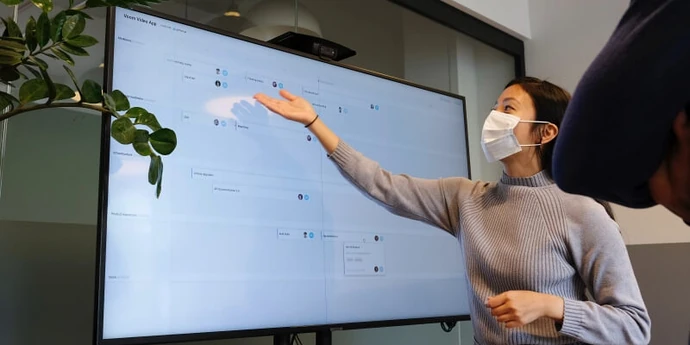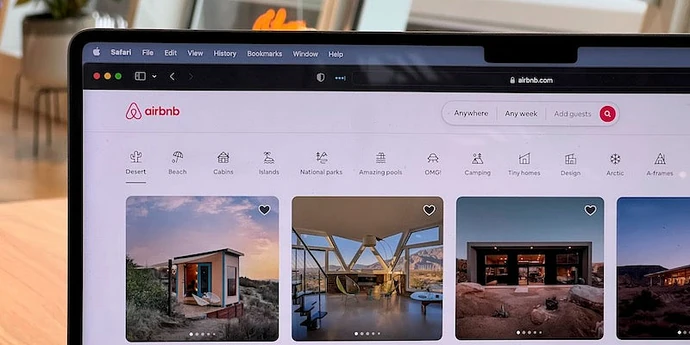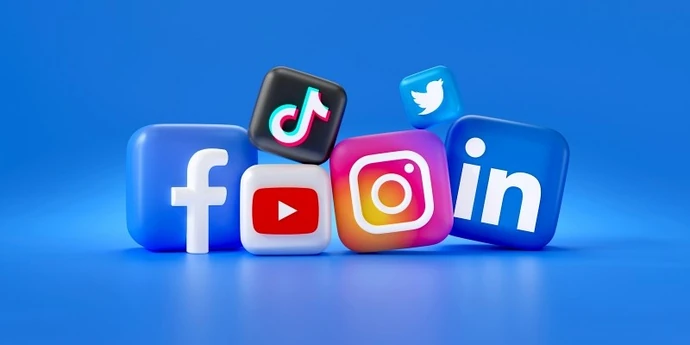If you’re interviewing for a product manager role at (Meta), the analytical thinking interview (formerly called "product execution") is one of the three types of interviews you’re going to need to crack.
The questions are analytical and data-focused, such as: “If you’re the product manager for Instagram Reels, define the goals and metrics”, or “A Meta product shows a 10% drop in newly registered users: what data would you need to understand and fix the problem?”
To help you, we’ve created this guide to give you everything you need to know to prepare for the analytical thinking interview, including the process low-down, example questions, how to answer, and a practice plan to make sure you land that Meta product manager job.
Here’s a brief overview of what we’ll cover.
1. What is the Meta analytical thinking interview?
2. Example questions
3. How to answer
4. How to practice
This guide is specific for Meta candidates, but it will still be relevant if you're preparing for a product execution interview at another top company. We also have guides that cover Uber execution questions, Apple analysis questions, Lyft execution questions, Stripe execution questions, Coinbase execution questions, and Google analytical questions).
Let’s get started.
Click here to practice with ex-Meta PM coaches
1. What is the Meta analytical thinking interview?
First, let’s take a look at the analytical thinking interview’s place in the product management hiring process, and then we’ll dive into what it aims to assess you on.
The analytical thinking interview is one of three types of interviews you’ll face if you’re applying for a product manager role at Meta, the others being a “product sense” interview and a "leadership & drive interview", (which is made up of behavioral interview questions).
You will face analytical thinking questions both at the initial first-round stage (phone or video interview) and the onsite interview. You’ll be expected to lead the conversation, and you’ll need to sketch out your answer on a whiteboard or the online equivalent.
For a closer look at the PM interview process at Meta and more information on the two other types of interview rounds within it, take a look at our ultimate Meta product manager interview guide.
1.1 What does it test for?
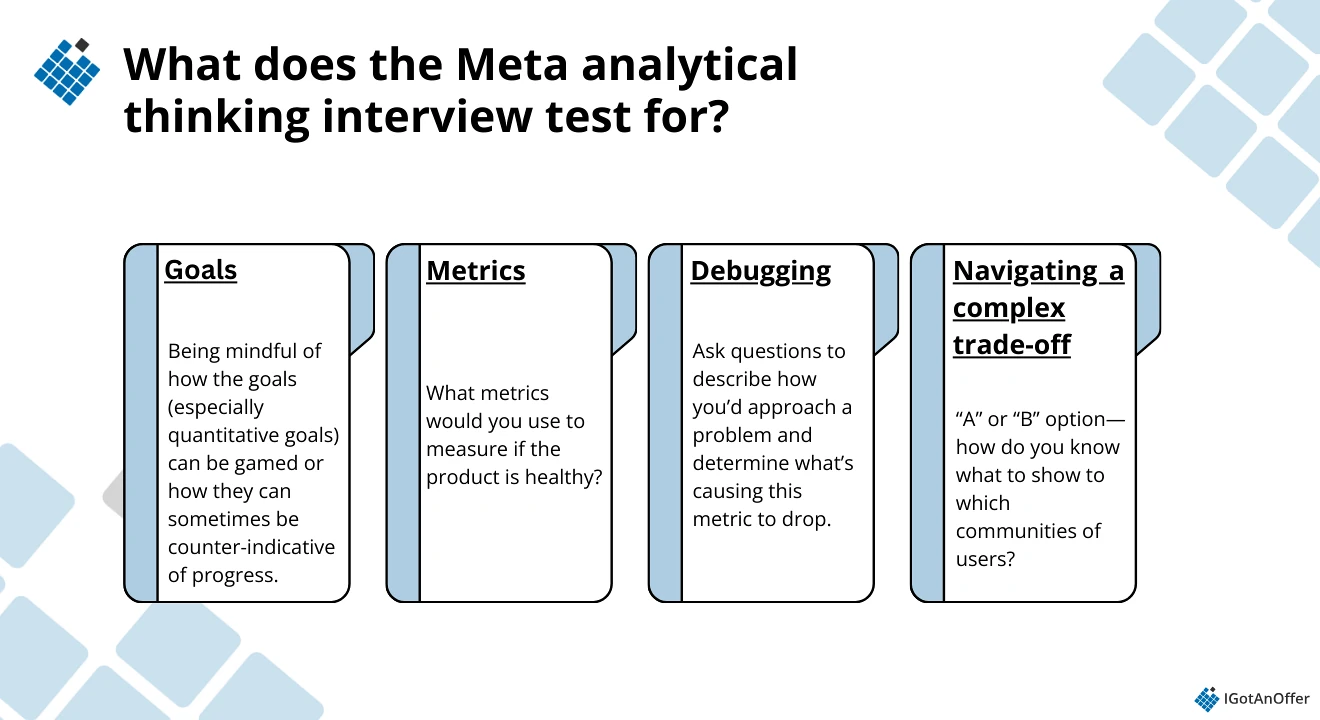
As an ex-director of product outlines in this insider article on the Facebook PM interview, Meta often describes its product process as "Understand, Identify, Execute."
While the product sense round tests you on the first two parts of the process, the analytical thinking interview assesses you on the latter: how you execute solutions.
However, Meta comes at this not from a project management perspective (they already assume you can get tasks done) but from a data perspective. Your interviewer wants to see that you can use data to make the right decisions. This is why they re-named it from "product execution" to "analytical thinking".
The analytical thinking interview is therefore highly analytical, data-driven, and KPI-focused. As this helpful Meta interview prep guide outlines, your interviewer will be looking for four key things to see if your “analytical thinking” is up to Meta standards:
What does the Meta analytical thinking interview test for?
- Goals: Being mindful of how the goals (especially quantitative goals) can be gamed or how they can sometimes be counter-indicative of progress.
- Metrics: What would you use to measure if the product is healthy? Which one would you prioritize? What happens if one is decreasing and the other is increasing?
- Debugging: Say you notice a specific metric dropping week after week. The interviewer will present a problem statement, and you should ask questions to describe how you’d approach this challenge and determine what’s causing this metric to drop.
- Navigating a complex trade-off: “A” or “B” option—how do you know what to show to which communities of users?
Example Meta analytical thinking interview rubrics
FAANG companies, including Meta, are very secretive about the exact details of their interview grading rubrics. Below is an example set of evaluation criteria for Analytical Thinking (Product Execution) that Noah recommends PM candidates use to guide their prep.
Use this sample rubric to identify potential gaps in your approach and improve your answers before the actual interviews.
Note that these are NOT Meta’s actual interview rubric, but a representative example based on Meta’s PM interview loop guide.
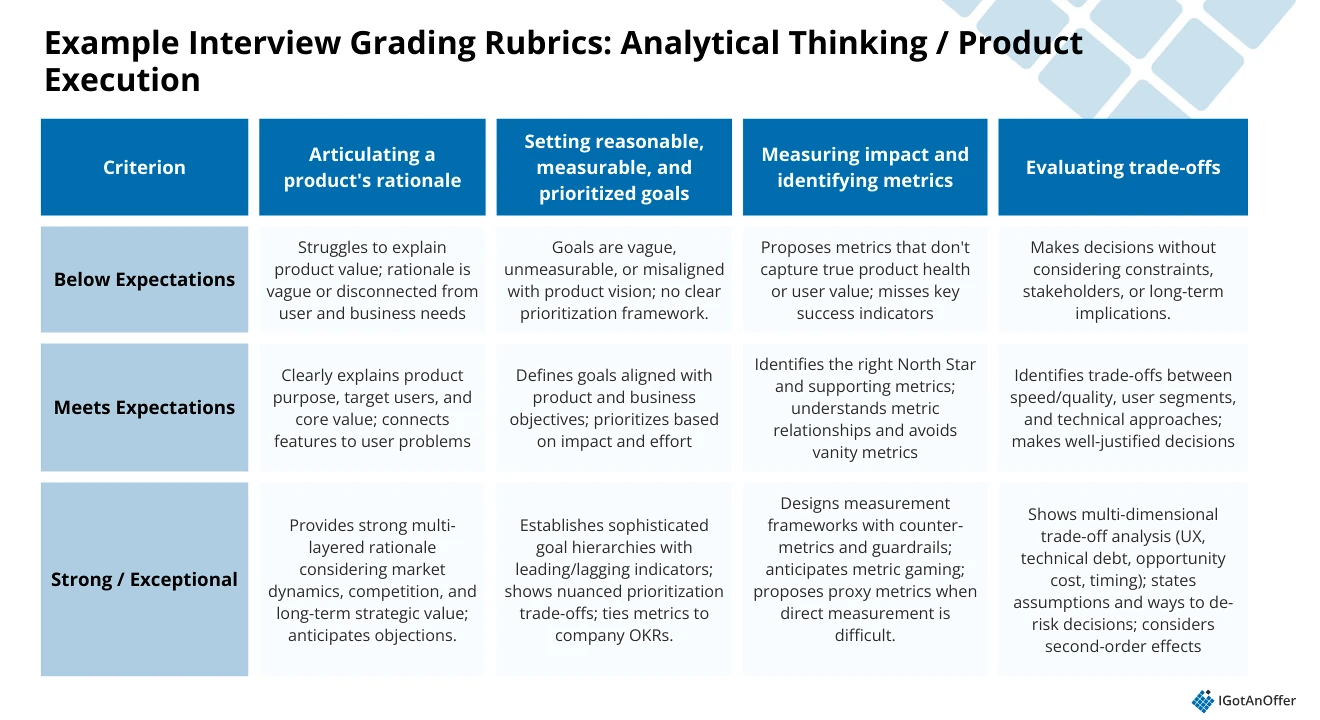
In addition to the scores, interviewers also submit a summary note, such as “Soft no,” “Suggest re-evaluate,” or “Strong yes,” which can significantly influence the hiring decision.
Once all evaluations have been submitted, there are three possible outcomes:
- You move forward for approval if most interviewers recommend “Hire” or “Strong Hire”
- You may be asked to complete follow-up interviews if feedback is mixed or additional information is needed
- You are rejected if there are multiple “No hire” or “Strong no hire” recommendations
After the post-evaluation stage, candidates who pass the hiring committee move on to leveling and team matching.
Right, now that you know more context about what the analytical thinking interview is trying to test you on, let’s take a look at some questions.
2. Meta analytical thinking/product execution interview questions
After analyzing the questions reported by PM candidates on Glassdoor, we can confirm that you’ll face questions that test you in the four areas listed above: goals, metrics, debugging and trade-offs. However, goal-setting questions and metric definition questions tend to be combined, so in reality, there are three types of questions you can expect to face in the interview:
- Goal-setting and metric definition questions
- Debugging questions
- Trade-off questions
You should keep in mind that the interview will be very fluid, and one type of question will often merge into another, as would be the case in a real-life product management situation. For instance, most questions will eventually lead you to consider a trade-off of some description.
Right, let’s take a look at some questions. These are all real examples of analytical thinking questions posed by Meta to PM candidates. We’ve simply changed the wording and grammar in some places to make them easier to understand.
Meta analytical thinking/product execution interview question examples
Goal-setting and metric definition
- You are a product manager for Netflix who has build a product for consuming podcasts. It launched 6 months ago. How do you measure success?
- How would you set goals and success metrics for Meta Pay?
- How would you set goals and measure success for Facebook Live?
- How would you set goals and measure success for Facebook notifications?
- How would you set goals and measure success for Instagram stories?
- How would you determine the success of the blue check marks that denote verified users on Instagram?
- How would you measure the success of Instagram stories?
- How would you measure the success of a Roku (HD streaming) stick?
- How would you measure the success of an app for creating meetings?
Debugging (metric change)
- Amount of dollars sent using Meta Pay went down, why?
- Facebook Groups usage dropped by 10% — what do you do?
- Facebook ads revenue dropped by 20% — what do you do?
- Facebook newsfeed engagement dropped by 2% — what do you do?
Trade-off
- What the engineering team should focus on building next and why?
- You are the PM for Facebook Live — what features would you prioritize?
- You are the PM for Facebook pages — what features would you prioritize?
- How would you evaluate a trade-off between boosting ad revenue and decreasing retention?
Exercise: Watch the video below to see how an ex-Facebook PM answers the question "How would you prioritize features for WhatsApp?". Pause the video throughout so that you can construct your own answer and see how it compares.
3. How to answer Meta analytical thinking questions
Now that we’ve seen examples of the questions you’re likely to face, let’s dive into how best to answer them.
3.1 Goal-setting and metric definition questions
These are questions like “If you’re the product manager for Facebook Sponsored Posts, define the goals and metrics.”
Here, the focus is on your ability to define metrics that provide clarity on the health of a product or feature. There are many different metrics you could be tracking, (e.g. impressions, clicks, return on ad spend, etc.) and your interviewer will want to hear you select the most important ones using a rigorous process.
We recommend the GAME method to structure your approach to these questions. The four steps are:
-
Goals
-
Actions
-
Metrics
-
Evaluations
Study our full explanation of how you can use the GAME method to ace goal-setting and metric definition questions.
3.2 Debugging questions
These are questions like “A Meta product shows a 10% drop in newly registered users: what data would you need to understand and fix the problem?”
These questions that Meta calls “debugging” are sometimes referred to as "root cause" or "diagnosis" questions, but we call them “metric change" questions. They test if you know what to do when a key product metric (e.g. traffic, revenue, engagement, etc.) is going up or down for no apparent reason. There are many different reasons why this change might be happening, and your interviewer will want to see you take a bulletproof approach to find the root cause of the issue.
Here at IGotAnOffer, we've developed our own method to help you give a clear and thorough answer to debugging/metric change questions. The three steps are:
-
Define the metric change
-
Explore possible root causes of the change
-
Conclude
This method is easy to use and helps you to avoid a huge pitfall that many candidates walk into straight away. Learn it in full here, below our explanation of the GAME method (simply scroll down to section 2.2)
3.3. Trade-off questions
These are questions such as “How would you evaluate a trade-off between boosting ad revenue and decreasing retention?”
These questions are often referred to as prioritization questions. They test whether you can make difficult prioritization and trade-off decisions in pursuit of goals, then adapt plans as the team executes.
To structure your answers, we recommend using the RICE framework.
-
Reach
-
Impact
-
Confidence
-
Effort
Study the method in more detail in our guide to prioritization and trade-off questions here.
To bring in more depth and a variety of ideas on prioritization, read the approach outlined here by a current Meta PM and practice incorporating elements of it into your answer.
4. How to practice analytical thinking & execution questions
We've coached more than 15,000 people for interviews since 2018. There are essentially three activities you can do to practice for interviews. Here’s what we've learned about each of them.
4.1 Learn by yourself
Learning by yourself is an essential first step. We recommend you make full use of the free prep resources on this blog and also watch some mock interviews on our product management YouTube channel. That way you can see what an excellent answer looks like.
We also recommend downloading our Meta fact sheet to learn more about Meta as a platform.
People often ask us if we offer prep courses. We don't, but if you'd like to buy one, we'd recommend the Product Alliance Flagship Meta PM course. It has some great Meta-specific insights and goes into pretty good detail.
Once you’re in command of the subject matter, you’ll want to practice answering questions. But by yourself, you can’t simulate thinking on your feet or the pressure of performing in front of a stranger. Plus, there are no unexpected follow-up questions and no feedback.
That’s why many candidates try to practice with friends or peers.
4.2 Practice with peers
If you have friends or peers who can do mock interviews with you, that's an option worth trying. It’s free, but be warned, you may come up against the following problems:
- It’s hard to know if the feedback you get is accurate
- They’re unlikely to have insider knowledge of interviews at your target company
- On peer platforms, people often waste your time by not showing up
For those reasons, many candidates skip peer mock interviews and go straight to mock interviews with an expert.
4.3 Practice with experienced PM interviewers
In our experience, practicing real interviews with experts who can give you company-specific feedback makes a huge difference.
Find a Meta product manager interview coach so you can::
- Test yourself under real interview conditions
- Get accurate feedback from a real expert
- Build your confidence
- Get company-specific insights
- Learn how to tell the right stories, better.
- Save time by focusing your preparation
Landing a job at a big tech company often results in a $50,000 per year or more increase in total compensation. In our experience, three or four coaching sessions worth ~$500 make a significant difference in your ability to land the job. That’s an ROI of 100x!








